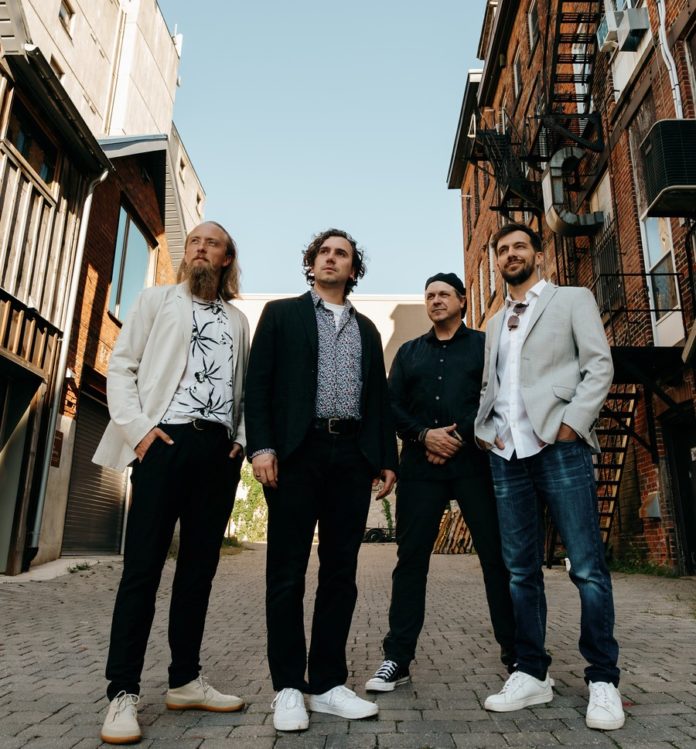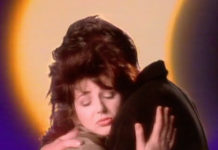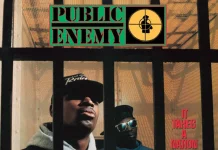Technological Luddism is hardly a new thing among musical purists. But Downie Street Collective are so convincing about it that you might be tempted to chuck your smartphone into the nearest river and retreat to the nearest farm to start raising your own meat.
On their new single, “Analog Man,” the band takes a hard look at the human experience in the age of digital overload. The song, they explain, is meant to decry “the growing dissonance between our innate need for physical, human connection and the increasingly virtual world we inhabit.”
“What is lost when we trade touch for taps, skin for swipes?” they wonder.
The answer, as the song’s probing lyric reveals, includes but is not limited to “Polaroids, an old paper map,” “a 45 I’m dying to spin,” and a bunch of other relics of a simpler time that our traditionalist narrator isn’t ready to let go of. Reaching out to the one he loves across the computerized threshold he abhors—but which he’s almost been forced to acknowledge as a necessary evil—he implores her to:
Send a hug with a digital kiss
The screen reminds of what I’m going to miss
I’m a romantic, I’m an Analog Man
And for a guy like that, the present is a tough place to be. As the picturesque middle verse reveals, it’s like:
A lonely night with echoes and fears
Cellphone is virtually useless in here
The radio plays in and out of tune
A new reality so cold and canned
I want to hold you but I can’t feel your hand
Sometimes it’s tragic to be an Analog Man
By the end, though, the two of them have managed to shake off the high-tech shackles of today and find refuge in the real.
Lay with your heart in mine as we sleep
Laughing in your arms, entwined at the feet
So fantastic being an Analog Man
Some kind of magic being an Analog Man
Not surprisingly, the song was written during the darkest days of the covid lockdowns, when the band members had to resort to desperate measures like driving 45 minutes just to sit on a girlfriend’s back patio and talk on the phone, from opposite sides of a sliding glass door. Or, even more ominously, to meet at a church graveyard at night and try to hold a conversation through heavy masks from 10 feet apart.
When it comes to musical exuberance, though, “Analog Man” is anything but a wake. It’s a jaunty, invigorating little ditty that thoroughly lives up to the band’s extensive list of stated influences: Barenaked Ladies, 54-40, Sloan, Northern Pikes, The Pursuit of Happiness … oh, and Big Sugar, I Mother Earth, The Tragically Hip and The Grapes of Wrath. Appropriate to its subject matter, the song nails the group’s overweening artistic goal of sounding “nostalgic yet fresh,” with a reverb heavy sound and an angular, anxious rhythm that would have been right at home on an episode of Hullabaloo. You could totally do the Swim to it.
Recorded at Westmorland Studio in Hamilton, the track benefited immeasurably from the production of Carl Jennings, whose hands-on approach was just right for the tactile, organic, very human ethos they were all pushing.
“He’s got this great way of hearing you play and then saying, ‘I think what you mean is this …,’ and either vocalizing or playing your intended idea,” the group says. “That way of working really helped us shape the sound.”
“Analog Man” is a new high-water mark In the Downie Street Collective’s ongoing agenda of blending introspective lyricism, emotive vocals, intricate guitar riffs and compelling beats. Not coincidentally, those are the same qualities that have made the group a popular presence in their home of Stratford, Ontario, and beyond, with club audiences and festival crowds alike falling under the spell of their ability to share genuine, resonant emotions via story and song. Each new show wins a flock of fresh converts to the gospel of authenticity laid down by the group’s current lineup of Andy Allen (rhythm guitar and keyboards), Scott Beaudin (lead vocals and keyboards), Peter Dixon (bass), Mark Ippersiel (drums) and Eric Lundgren (lead guitar).
And every time that happens, it’s a victory for the “keepin’ it real” philosophy that “Analog Man”—and the group itself—are all about.
“We as a society seem to rely more now on the digital ‘fix’ than the analog ‘touch’ or ‘presence,’” the band says. “To us, there is nothing that can compare. Or compete.”







